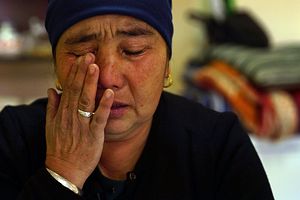Each story is heartbreaking: The ethnic Kyrgyz student from Xinjiang who helped revive a classic Kyrgyz dance went back to Xinjiang in October 2018 and never returned to his studies in Kyrgyzstan; the young Turkish Uyghur woman who had been living in Urumqi with her parents and returned to Turkey to renew her visa only to get news that while she was away, her parents had been detained; two children, aged 7 and 6, with Turkish citizenship traveled to Xinjinag with their mother on her Chinese passport and have not been heard from since; the 75-year old father of a California man, with legal status to stay in the United States, returned to Xinjiang and disappeared.
With estimates now suggesting that as many as 1.5 million people — mostly Uyghurs, but also other Muslim minorities in Xinjiang like Kazakhs and Kyrgyz — have been detained in sprawling “re-education” camps, governments around the world have wrestled with how to respond. Those that have responded have struggled to do so effectively.
Several recent reports highlight this reality. I’ll focus on the Central Asian countries of Kazakhstan and Kyrgyzstan (but encourage you to read this recent Buzzfeed report on Turkish citizens detained in Xinjiang.)
In a dispatch for Foreign Policy, Gene A. Bunin recounts the stories of ethnic Kyrgyz students from Xinjiang who have disappeared into their homeland. Anchoring the story around Turgunaly Tursunaly, a young man with a deep connection to Kyrgyzstan (he helped revive the “Kara Jorgo” dance and is the grandson of a famous manaschy), Bunin writes that “Tursunaly is the brightest of counterexamples” to Beijing’s official line that those in the camps are being trained and cleanse of “extremist thoughts.”
Folk musicians and performers, a professor, and more than two dozen university students are among the ethnic Kyrgyz to have disappeared into Xinjiang’s camps. At least 20 students, Bunin reports, were expelled from Kyrgyz National University in 2018 after failing to return to campus following the 2017-2018 winter break. One university staff member told Bunin, “Only the [Han] Chinese students returned [to Kyrgyzstan] that spring.”
The “sympathy and discontent” Bunin found among university staff in the departments where the students studied and those who knew them contrasted sharply with upper management — both in the universities and the government.
As in neighboring Kazakhstan, the Kyrgyz government has taken a careful and quiet approach to the Xinjiang matter. In late November 2018, as some in the Kyrgyz parliament pressed for answers and relatives and civil society groups began mustering, the government’s replies were muted. Then in December, Kyrgyz President Sooronbay Jeenbekov said the magic words (emphasis mine): “We are working through diplomatic channels. In this matter, we must bear in mind that we are talking about the citizens of China. How can we interfere with the internal affairs of another country?”
Kazakhstan has developed a similar strategy: Using diplomatic channels to secure the release of Kazakh citizens, but relegating the fate of ethnic Kazakh Chinese citizens to an “internal matter.”
In recent weeks, Kazakhstan has taken active steps to tamp down on agitation for greater pressure on China over the issue of ethnic Kazakhs detained in Xinjiang. The arrest of Serikzhan Bilash on March 10 was illustrative of the boundaries of Nur-Sultan’s tolerance in this area. Bilash has reportedly been charged with inciting ethnic hatred. While he has been released to house arrest, the future of the activist group he headed is unclear.
So too is the still-uncertain fate of Sayragul Sauytbay, an ethnic Kazakh Chinese citizen who worked in one of the Xinjiang camps and fled across the Kazakh border (illegally, as the Chinese authorities had taken her passport). Kazakhstan declined to deport her in August 2018, but has also declined to grant her asylum. According to a recent Globe and Mail report chronicling several stories of individuals who have been detained in Xinjiang and released back to Kazakhstan, Sauytbay — who is serving a six-month suspended sentence at home with her family — recounts experiencing harassment and threats that sound all-too-familiar:
Ms. Sauytbay has often spotted unknown cars parked outside her home. On several occasions, strangers walked up to her house to tell her she was a criminal and “the Chinese government is able to take me back whenever they want. So be careful.” Once, when she and her husband both stepped out at the same time, a stranger came to the house “and threatened my two children, saying your mother is bad.”
Meanwhile, on March 28, Kazakh Foreign Minister Beibut Atamkulov met with his counterpart Wang Yi in Beijing. According to the Chinese readout of their talks, “The Kazakh side understands and supports the measures taken in Xinjiang to combat the ‘three forces’ and to ensure regional security and stability.”
There are no shortage of stories to underpin the conclusion that China is engaged in a massive violation of human rights in Xinjiang. But neighboring governments, with deep economic dependence on China and having adopted Chinese narratives about the “three evils” — “terrorism, separatism and religious extremism” — find themselves lacking any avenues that don’t involve bending, ultimately, to Beijing’s will.
































